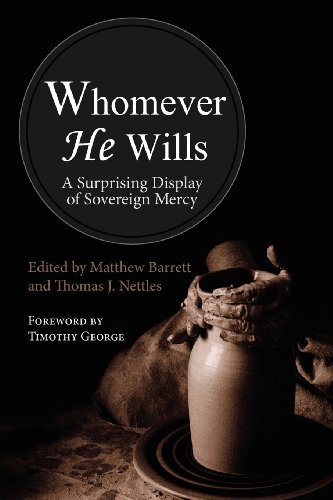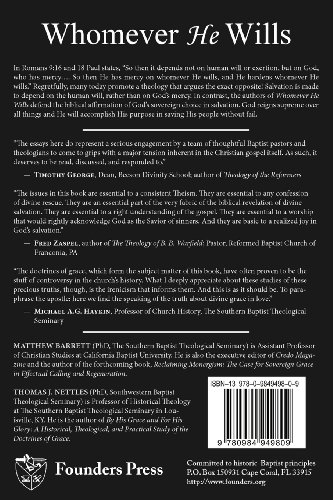



Whomever He Wills
O**
WOW!
This is not a quick read but is rewarding to those who endeavor to persevere. I found the chapter 7 "The Compatibility of Determinism and Human Freedom" by Bruce A. Ware a highlight in the book. It took my understanding to a new level in reconciling the sovereignty of God and human responsibility.
D**Y
You will struggle to put it down!
WOW!!!
T**M
read it several times
The Bible is pretty clear on this subject and the writers do an outstanding job bringing clarity to the scripture.
D**Y
Five Stars
Excellent book, but very expensive for a paper back book.
B**9
True grace
Excellent book on the doctrines of grace.Destroys the arminian distortion of scriptures .Easy read and to understand..Buy the book today.
D**N
Five Stars
A great corrective to the man centered theology of many in our day.
T**R
Outlining Calvinist Theology (Review from a non-Calvinist)
The stance on Calvinism has been a somewhat divisive subject within the Southern Baptist Convention in recent years, prompting leaders from both sides of the fence to provide a defense for their particular perspective on it. The division is usually stated as Calvinism versus Arminianism, but I would say that it's unwise to assume that because somewhat is not a Calvinist that they're automatically in the Arminian camp. Arminianism entails the belief that salvation can be lost, which is a definite disconnect from Southern Baptist belief. The division should be described more as "for Calvinism" and "against Calvinism," since this seems to be the way the debate has been approached. WHOSOEVER WILLS was a book from Southern Baptist leaders seeking to show the inconsistencies of Calvinism, so it would be properly called an "against Calvinism" defense.WHOMEVER HE WILLS is a new book, also by Southern Baptist leaders, but this time from the perspective of defending Calvinism. The book tackles each of the five points of Calvinism, describing them, debunking misconceptions that typically come about from their titles within the TULIP framework, and arguing from Scripture why they should be embraced as true. Additional chapters cover the topics of God's sovereignty over evil, evangelism within a Calvinism framework, the compatibility of determinism and human freedom.I'm not a Calvinist, but I've made that decision based on knowing Calvinism as deeply as I can. That's why I read books like this one. WHOMEVER HE WILLS is carefully argued by each of the theologians who wrote essays in the book. While I was familiar with all of the arguments in the book, I was surprised by Andrew Davis' embracing of reprobation and taking the approach that really seemed like God has to harden the hearts of unbelievers so that they won't believe. I'm sure he doesn't believe that unbelievers would believe if God didn't harden their hearts, but that was the logical implication I came away with.Throughout the book, it seems that the authors view themselves on the theological high ground, looking down on those who don't hold to Calvinistic doctrine. They also seem to view non-Calvinists as automatically Arminian. I can appreciate the authors' desires to see God glorified, and I think people wrestling with the issue would benefit from hearing the Calvinist side of the debate in this book.Review copy provided by Founders Press
J**P
Wonderful Defense of Monergism
Whomever He Wills: A Surprising Display of Sovereign Mercy is a compilation of essays from 15 different Southern Baptist pastors, teachers, leaders written as a response to the book Whosoever Wills. The book is an arguement for and a defense of Calvinistic Theology, specifically in how it relates to our salvation and in turn how we evangelize. I do want to start by saying that I am a Calvinist, and I echo Charles Spurgeon in saying, "I have my own private opinion that there is no such thing as preaching Christ and Him crucified, unless we preach what nowadays is called Calvinism. It is a nickname to call it Calvinism; Calvinism is the gospel, and nothing else. I do not believe we can preach the gospel, if we do not preach justification by faith, without works; nor unless we preach the sovereignty of God in His dispensation of grace; nor unless we exalt the electing, unchangeable, eternal, immutable, conquering love of Jehovah; nor do I think we can preach the gospel, unless we base it upon the special and particular redemption of His elect and chosen people which Christ wrought out upon the cross; nor can I comprehend a gospel which lets saints fall away after they are called, and suffers the children of God to be burned in the fires of damnation after having once believed in Jesus. Such a gospel I abhor." It is also important to state that I have come to understand these truths through the study of Scripture, not of man's doctrinal systems. The debate between Calvinism and Arminianism is one that has countless books and sermons published in regards to it. So why do we need another? My first response would be: God getting the maximum glory for how He saves sinners is not a topic that we can exhaust and it is one which we should exert maximum effort to understand better. So, this book is needed if it indeed gives its readers a better picture of Who God is and what He has done for sinners. It is on this point that the contributors of this book have excelled. I have read multiple books on the Doctrines of Grace, but none have been as helpful to my thinking as this book has. I was truly amazed at the amount of work that has gone into this book and how readable it is. It is a slow read, as it is taking on very weighty matters, but it is one that many believers should be able to work through. There is far too much material to comment on it all, but I do want to mention a few chapters that really stood out to me. The chapter on Unconditional Election by Andrew Davis may be the most clear and complete short writing I have ever read on this subject. In 40 pages, Davis lays out an extremely strong, biblical case for God's election of sinners. At the end of the chapter, Davis gives 13 arguments against election based on foreseen faith. The first is: Election based on foreseen faith robs God of His glory as Sovereign King of the universe. In this section he states that this view "God the Creator has surrendered control of the universe to the creature, and He has done so in the most vital matter of God's glory and man's humility: human salvation from sin..... God is pictured as a student of the human heart, rather that the Potter shaping the clay of the human heart." This simple statement is similar to the train of thought that really starting me on my road to examining what Scripture said about how God saves sinners. Many of these other arguments are common ones heard against election so I am glad that the author chose to treat them in this manner at the end of the chapter. Another chapter titled, The Scriptural Affirmation of Monergism by Matthew Barrett really blew me away. This chapter is 68 pages and is worth the purchase of the book. Barrett clearly and Scripturally lays out how God saves people. For anyone struggling with Calvinism or not sure what it teaches, this would be a perfect introduction to Calvinistic Soteriology. Another chapter that I really appreciated was Calvinism Foundational for Evangelism and Missions by Tom Ascol. I love this chapter because this is an area where Calvinism is misunderstood greatly. My evangelism and love for missions is fueled by the Doctrines of Grace, not hindered by it and Tom Ascol does a wonderful job showing how interconnected these are. I was truly blessed by this chapter. I want to state again how important I think this book is in explaining and defending Calvinism. I will certainly be referencing this book for years to come.I highly recommend it!! I received a free copy of this book from Founders Press in exchange for an honest review.
Trustpilot
2 weeks ago
1 day ago